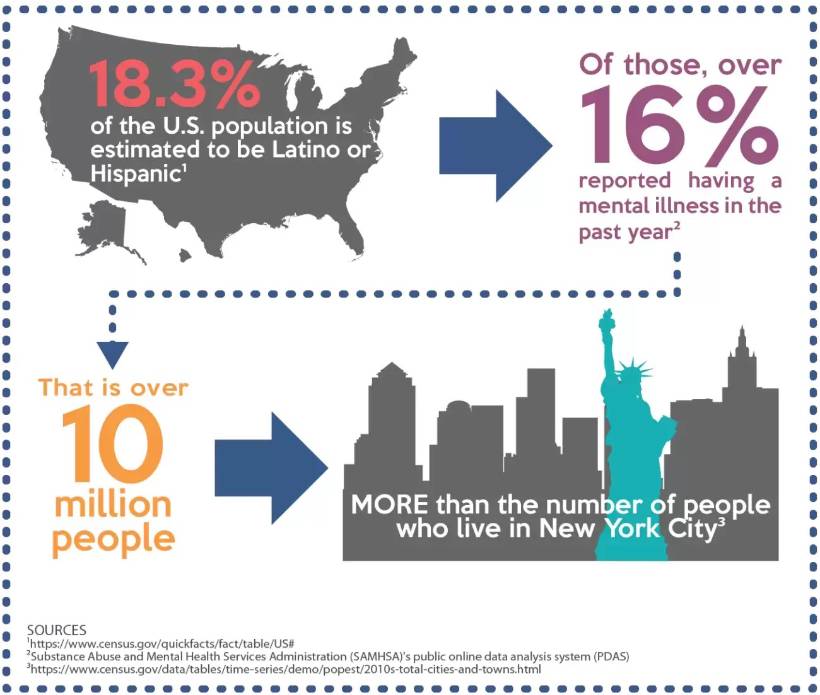5 Benefits of Becoming an MFT Who Serves the Latinx Community

A career as a Marriage and Family Therapist that serves the Latinx population can be incredibly rewarding, both personally and professionally.
Marriage and Family Therapists have one of the most meaningful jobs—literally saving lives every day by helping to treat mental health issues that affect millions of Americans. The demand for mental health services is growing faster than ever before, yet disparities in access to care still affect underserved populations.
If you’re passionate about helping others and your community, being an MFT specializing in working with Latinx patients may be just what you’ve been looking for.
Here are five benefits of becoming an MFT dedicated to working with this underserved community.
- Serve a growing Spanish-speaking population.
- Honor diversity in the Latinx communities.
- Break the stigma around mental health services.
- Expand your career possibilities.
- Find a rewarding career that fulfills you.
What is an MFT?
A marriage and family therapist is a mental health professional who provides support to individuals, couples, and families. They work with clients to recognize and understand the root causes of disputes or mental health issues, helping them develop solutions that respect everybody’s needs and interests. Marriage and family therapists use talk therapy techniques such as cognitive-behavioral therapy or systems theory to help their clients build successful relationships and find resolutions within families. They also help individuals manage stress, depression, trauma, grief, and relationship problems created by conflict or changing life circumstances.
An MFT with a Latinx counseling emphasis works with Latinx and Spanish-speaking clients to provide mental health resources that are useful and accessible by providing services in Spanish. They have a strong understanding of the unique cultural and societal factors that contribute to mental health struggles in Latinx and Hispanic communities.
Mental Health Access and the Latinx Community: The Facts

Photo Credit: Mental Health America
- The Latinx community in the United States is made up of people from many different countries, including individuals of Mexican, Puerto Rican, Cuban, Central American, and South American descent. (NAMI)
- The Latinx/Hispanic population is the second-largest racial/ethnic group in the United States. (AFSP)
- Only 35% of Latinx adults with mental illness receive treatment yearly compared to the U.S. average of 46%. (NAMI)
- 19% of Latinx people in the United States live in poverty. (MHA)
- Research shows that older adults and youth in the Latinx/Hispanic population are more susceptible to mental distress relating to immigration and acculturation. (MHA)
- Alcohol misuse, tobacco and marijuana use, illicit drug use, and prescription drug misuse are more frequent among Latinx adults with mental illnesses. (MHA)
Unique Issues Contributing to Mental Health Struggles in the Latinx Community
In addition to the struggles that many Americans face today—relationship issues, work problems, gender and sexual identity struggles, trauma, PTSD, and so many more—there are other issue that contribute to mental illness that are unique to the Latinx community in the United States.
- Language Barriers: When seeking counseling, the communication problem caused by language differences can make it difficult to talk about sensitive matters or topics that require a lot of explanation. Patients who aren't fluent in English need to find a bilingual mental health provider, which significantly narrows their pool of potential providers.
- Acculturation: The acculturation process (the process of learning and incorporating the values, beliefs, language, and customs of a new culture) can have a significant effect on depression levels. A 2018 study showed that immigrants with "lower levels of acculturation were likely to have more symptoms of depression.") Cultural differences and a lack of cultural understanding on the part of the mental health provider often lead to misunderstanding or misdiagnosis of Latinx patients.
- Immigration and Legal Status: Immigrants who arrive without documentation may choose not to seek mental health due to fear of deportation. Even though the Affordable Care Act provides undocumented immigrants with health insurance, many people do not know about their eligibility. Additionally, the immigration process itself can be a traumatic experience for some.
- Religion: Many individuals in the Latinx community come from strong religious backgrounds that contribute to the stigma against mental health care. For many people, discussing their mental health struggles can be a cause of embarrassment and shame for the family.

Benefits of Becoming an MFT Who Serves the Latinx Community
Becoming an MFT who serves the Latinx community can bring many benefits. You'll serve one of the fastest-growing populations in the United States and can help break down the stigma around mental health care, all while expanding your own professional practice in the mental health field.
Furthermore, you may also have the opportunity to get involved in advocacy efforts that fight against discrimination and access to medical care based on culture or ethnicity.
1. Serve a Growing Spanish-Speaking Population
Members of the Latinx community account for 54% of the U.S. population and are expected to account for 119 million people by 2060. For people who aren't native English speakers, difficulty communicating with healthcare providers is often an issue. Additionally, bilingual patients are evaluated differently in English versus Spanish, contributing to frequent misdiagnosis of Latinx patients.
There is a shortage of Spanish-speaking professionals in mental health settings, and hiring a translator isn't an equivalent solution. For patients who are struggling with sensitive or complex issues, it can be difficult enough to open up to a therapist without adding the barrier of an additional person in the room to translate.
A licensed Marriage and Family Therapist who serves the Latinx community should be well-versed in Spanish language and culture. Pepperdine University's MA in Clinical Psychology with Emphasis in MFT with Latinx Communities degree program includes Latinx-specific content and experiential Spanish-language development courses.
2. Honor Diversity in the Latinx Community
Members of the Latinx community originate from many different countries around the world, each with their own beliefs, cultural practices, dialects, and needs.
Mental health professionals can work to honor diversity in the Latinx Community through several strategies. As you educate yourself on the cultural and structural influences that shape the lives of people from Latin American countries and communities, you can practice culturally sensitive approaches when offering services and providing care. This means tailoring treatments to the person’s social, emotional, and cultural needs.
With the proper training, you'll be able to recognize the unique challenges faced by this population—such as language barriers or racism—when offering therapies and interventions. Your knowledge of your own cultural identity will help you respect differing beliefs about mental health issues which may be more stigmatized in certain communities or family structures.
3. Break the Stigma Around Mental Health Services
There is a significant stigma around mental health conditions in the United States, and certain populations are more affected by this stigma than others. Men, older generations, and those from the Latinx community are less likely to seek mental health care for fear of embarrassment or being perceived as "weak."
The more mental health agencies and family counseling programs we can offer specifically for the Latinx community that provide culturally sensitive services in the patient's native language, the more we can move the needle toward destigmatizing mental health conditions and seeking care.
4. Expand Your Career Possibilities
Psychology is one of the most rapidly growing fields in the country. And even though there are more psychologists working in the field than ever before, there's still a significant gap in licensed clinical therapists who are fluent in Spanish. Employment opportunities for mental health professionals are expected to increase by 22% by 2028, and with the growing population of Spanish-speaking immigrants, there will be numerous opportunities for bilingual therapists.
There is a need for therapists and counselors in many clinical and professional settings, including community counseling and advocacy centers, schools, government agencies, and many other settings. Whether you want to work in a private practice or you'd prefer to work in a community mental health setting, there are plenty of opportunities to work with this underserved population.
5. Find a Rewarding Career That Fulfills You
In a post-pandemic world where only 20% of U.S. workers feel passionate about their jobs, finding work that is meaningful to you is more important than ever. Research shows that those who work in mental health and psychology are much more satisfied with their work, with over 90% of professionals in this field indicating that their work feels meaningful.
Working with individuals who suffer from mental illness, trauma, or complicated family dynamics can be emotionally heavy, and the unique challenges faced by the Latinx community can intensify that feeling, but knowing that you've made a positive impact in the lives of others is one of the most rewarding things you can get from your work.

What You'll Learn With a Master’s in Clinical Psychology with an Emphasis in MFT with Latinx Communities
The Master of Arts in Clinical Psychology with Latinx Communities degree program prepares students to serve Latinx individuals, couples, families, and communities as a licensed marriage and family therapist (LMFT) or a licensed professional clinical counselor (LPCC) in California.
The program utilizes a practitioner-scholar model of professional training that pairs rigorous coursework with in-depth clinical training where students observe professional counselors, develop key clinical skills, and gain experience working directly with clients in the underserved Latinx community.
Upon graduation, students will have met all educational requirements to sit for the LMFT or LPCC licensure exams in the state of California.
Our program offers:
- Up to 30 Latinx-specific LMFT credits
- Spanish-language development courses for students with elementary-to-advanced proficiency
- Opportunity for participation in a Spanish Immersion Program to gain experience in a Latin-American country
- Community service projects directly assisting local communities
- Opportunity for bilingual supervision for students providing services in Spanish during their clinical practicum experience
Pepperdine University's Antiracism and Antidiscrimination Statement
The Aliento and GSEP psychology division stand in solidarity against racial inequities and injustice and other forms of discrimination and oppression. We are committed to fostering an inclusive learning environment that is enriched and strengthened by diversity including but not limited to race, ethnicity and national origin, gender and gender identity, sexuality, class, age, ability status, and religion. GSEP also encourages all community members to engage in critical learning and reflection to strengthen our capacity for being effective, active, and outspoken against all forms of racism and intersectional oppression.
Expand Your Career With an MFT Degree at Pepperdine University
If you're ready to take the next step in your mental health career, consider getting an MA in MFT with an emphasis in Latinx Communities from Pepperdine University. Pepperdine Graduate School of Education and Psychology offers over $6,000,000 in scholarships every year, with the majority of students receiving financial assistance.
For more information on the application process and admissions requirements, attend one of our upcoming informational sessions.
Ready to get started? Learn more about applying for the MA in Clinical Psychology with an Emphasis in Latinx Communities program here.